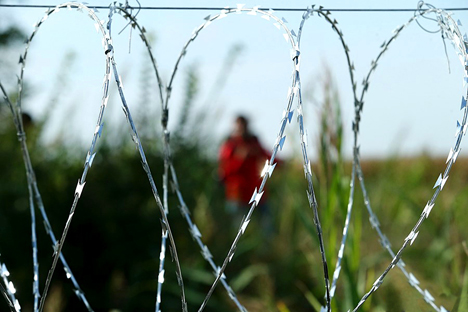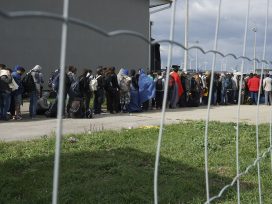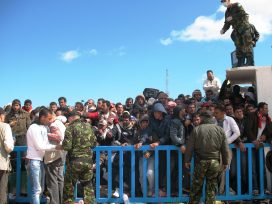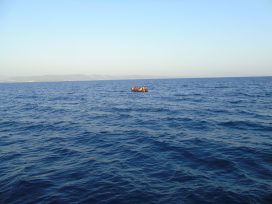Is Europe ready to live in a borderless world? This is a question that has been posed since before the launch of the Schengen Area in the mid-1990s. The answer then, and for the decade that followed, appeared to have been a definitive yes. Today, however, Europe is seemingly providing a new answer to the question of borders; that Europeans do not want to live in a borderless world.
One way of understanding the Greek myth of the woman named Europa – a Phoenician princess seduced by Zeus – and the bull is the need to go beyond one’s borders, to find one’s identity. In this sense, Europa, in other words Europe, equals boundlessness. The French philosopher Jacques Derrida claimed that an identity is never defined and Europe thus means a permanent search for self and identity. In today’s context this could be understood as Heimat and the universal values given to the world in the Declaration of the Rights of Man and of the Citizen in 1789 after the French Revolution. In this respect it is worth remembering that the very idea of the European project was to overcome national borders. This task has two dimensions today: Europe’s internal borders and its external borders; both of which are celebrating a comeback lately.

Migrants in Hungary near the Serbian border, 25 August 2015. Photo: Gémes Sándor / SzomSzed. Source: Wikimedia
The external border that Europe wants to “secure” most is its border with the South, the MENA region (Middle East and North Africa). The current discourse in Europe, however, neglects the fact that this “border” is a sea and can hardly be controlled. What is more, it seems to have been forgotten that the cultural heritage of the Mare Nostum (Our Sea), as the Mediterranean Sea has been called since antiquity, has always been a cloverleaf of the Orient and the Occident. From Homer’s Iliad to the Punic Wars, Europe knows what it is because of its mirror, its autrui. In the words of Emmanuel Levinas, the “Other that defines Europe is the Orient”. In this sense, Carthage was and is a European town. If Europe separates itself from its other half, it may lose itself entirely. Thus the European task of Othering should be about getting to know the Other; helping it reduce the root causes of its suffering, for which Europe is largely responsible, and slowing the current wave of refugees into the same Europe that is unable to manage the newcomers.
The European Other – the MENA region and sub-Saharan Africa – are not doing well today and Europe is faced with a modern exodus from Africa under new conditions. Too many of those who have nothing have plasma TVs which act as a window to the West and depict life in Europe. Some have suggested that as many as ten million people in North Africa have packed their bags.
The demographic developments of this region are stunning. Egypt alone will have around 28 million more inhabitants by 2030. Birth rates in countries such as the Democratic Republic of Congo, Niger or Nigeria are still 5.8 per women or higher. A UN population report predicts that Nigeria’s population will increase to 440 million people by mid-century and up to 900 million by the end of the century. Only a minority of young people (some 40 per cent) will have a job, most likely a low paid and low skilled one. Experts call it the “youth bulk”, an overhanging youth that society cannot integrate into the job market and social structures. This leads to a greater number of young people becoming radicalised.
In this sense, Africa is a powder keg on Europe’s doorstep and the refugee crisis is far from over, even though the Balkan Route is closed and the agreement with Turkey functions as a filter. The crisis also goes structurally beyond the current atrocities in Syria, which were only a trigger for the last wave of refugees. The root causes, for which Europe is largely responsible, from agricultural policy and arms sales to the origins of ISIS, need to be identified and addressed vigorously. Policies need to go far beyond border protection.
Today, some 370 million people live in the 19 countries of the MENA region. By 2030 there will be 100 million more. If we take into account sub-Saharan Africa, the picture is even bleaker. Today’s figure of 1.3 million people will rise to 1.3 billion by 2050. The result will be instability, war or more terrorism largely, coming from the younger generations. The so-called “war index” of young Africa – the number of young people entering the job market per year exceeding the number of retired people who leave it – is high (and very high in comparison with old Europe). While Germany has a “war index” of 0.66, meaning 660 young people for 1000 retired people, the rate in Uganda or Mali has reached six. Can this challenge be addressed with a better protected EU border? Most likely not. German Chancellor Angela Merkel in a recent interview for Die Zeit stated that helping Africa is the European task of tomorrow and that it is in Germany’s best interest to do so. Whoever wants to protect themselves needs to open up. The modernisation of Africa is crucial for Europe.
Paradox of globalisation
The truth is that we are living in a borderless world and we do not want to change that. “The world is flat”, wrote Thomas Friedman in 2001. We want the gas for our heating from Russia or Algeria and we want to fly to Hong Kong for Christmas. We want Africa’s resources, such as diamonds for our luxurious jewellery, and chia seeds from Latin America for the vegan lifestyle of European hipsters, while cheap electronics come from China for the not so wealthy. In fact, we want our borders open for trade, but not for people and that is the European dilemma.
The most famous chart of the last decade – the “elephant curve” – perfectly illustrates two things: first, statistically globalisation is beneficial and produces growth. Second, it does not benefit everyone evenly. The people of the lower quintile in European (or American) society have paid the price for globalisation: they lost their jobs. Europe’s former workers of the Fordist times are today’s losers of globalisation often voting for right-wing populists (or Donald Trump in the United States). Today rural often means unemployed and the unemployed are often seduced by populists. The social contract is broken in Western Europe and the left-behinds of globalisation see no future and feel threatened by the refugees. They specifically call for a closing of the borders. The conceptual question of the future will thus be how to reconcile social rights (e.g. unemployment benefits, health care) and human rights (shelter, food), which in principle everyone should enjoy according to the Geneva Convention. One of the acute problems in the current discussion about refugees in Germany is that they are granted access to social rights (e.g. housing), something which many Germans of the lowest quintile would also like to enjoy. How to determine who should be granted certain benefits and on what legal basis? Shall the belonging to a certain nationality prevail over the rights stemming from the Geneva Convention?
The fear of losing life opportunities to the Other is why former voters of the French communist party in the 1980s today vote for Front National, as Didier Eribon explained in his book Le Retour à Reims. But this is the case throughout Europe, from Norbert Hofer in Austria, UKIP in the UK, the True Fins and the Dutch Geert Wilders to the German PEGIDA movement. Dani Rodrik calls it the “paradox of globalisation” and argues that globalisation, sovereignty and democracy cannot co-exist. One needs to be abandoned. And it should be the national borders as the most visible sign of national sovereignty. However, in the international legal language sovereignty is defined as the “right of non-interference”.
Yet, in a flat world with everything being boundless – from algorithms to pipelines to airplanes – and with global interconnectedness, there is no longer a place for such a right. The logical consequence is for Europe to start thinking about a political system which is “flat”, just like the world in which we live. In other words, a sort of “network democracy”, in which national borders are subsequently eliminated and social cohesion is organised beyond borders. Instead, we stick even closer to national borders and national sovereignty, slowly leaving democracy behind altogether.
Beyond borders
Borders are the new buzzword in today’s political discourse in Europe. And these debates do not only focus on the EU’s external borders, but its internal ones as well, which is even more worrisome. Brexit is a good example of how Europe might be on route to pervert its very founding idea of boundlessness. A recent paper by Breugel, a Brussels-based think tank, suggests that a post-Brexit strategy should include the creation of a Continental Partnership, in which an external circle would be the single market and the inner one – a political union. The external circle would essentially benefit from open borders for capital, goods and services to the EU, yet would not allow for the free movement of persons. One of the four fundamental freedoms of the EU is obsolete, the authors argue. But such a scenario would come close to the perversion of the European idea: a borderless world only for goods and capital can barely be the goal for a reinvigorated European project of the 21st century. The most recent European crises precisely prove that the problem lies with missing political unity.
The promise of the Maastricht Treaty was that the EU will become a union of states and a union of citizens who will enjoy the right to travel and work throughout its territory. The recent backlash against the European idea in the form of Brexit will be most painfully felt by the Britons, among them many Scots, who are applying en masse for continental passports. Thus, the next European project needs to tackle the question of European citizenship, which must be granted to all and manifest itself in equal rights for every European citizen.
We need to remind ourselves that the idea of the European project was to go beyond borders and overcome the nation state. At least within Europe we should continue to be the avant-garde of this idea, the real-life laboratory for an ultimately universal goal: a global union of citizens which in 1792 Immanuel Kant already saw as the way to achieve perpetual peace.







